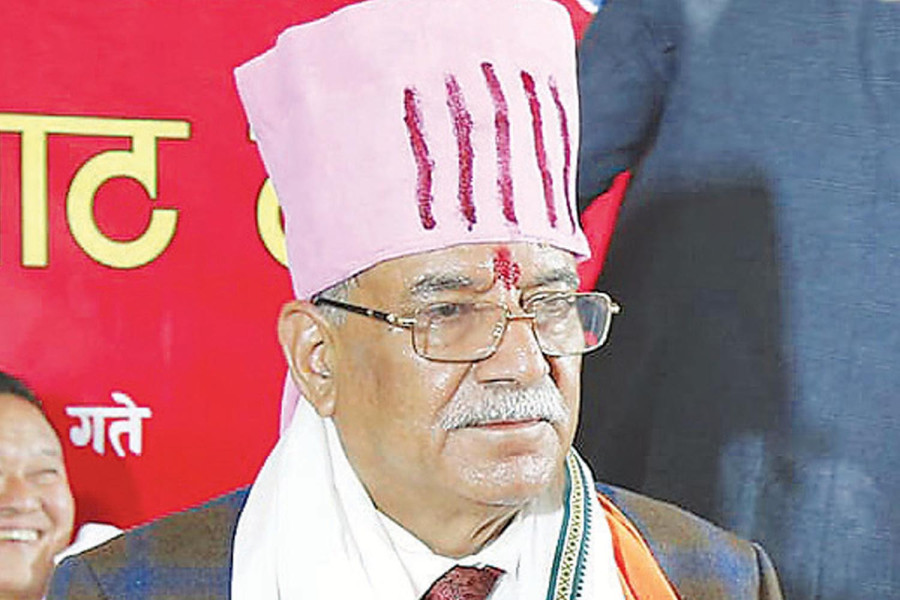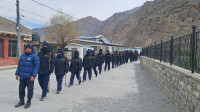Politics
Months out of power, Maoist Centre launches campaign to connect to people
Maoist leaders say their campaign aims to prepare foundation for a ‘socialist revolution’.
Post Report
After failing to deliver when in power, Nepal’s political parties often launch many campaigns to get connected with the public once out of power. This trend is becoming more apparent, especially after the November 2022 general election, wherein no political party gained a majority.
Both traditional and new political parties have adopted this strategy to get public attention.
The main opposition party CPN (Maoist Centre)’s ‘Tarai-Madhesh awakening campaign’, which kicked off on Monday from the eastern district Jhapa, is part of this trend. The Maoist leaders have said their campaign is aimed at preparing a foundation for a ‘socialist revolution’ by protecting the constitution, ensuring good governance and social justice, and rallying against the ‘threat of regression’.
They said the campaign will expose the government’s ‘tendency of protecting middlemen and corrupt people’ while opposing its autocratic tendency, for instance running the government through ordinances.
Similarly, the Maoist leaders said they will challenge the ruling coalition’s attempt to change the electoral system with a plan to establish a two-party system in the country.
Shakti Bahadur Basnet, a deputy general secretary of the Maoist Centre, claimed that their campaign’s objective differs from that of other political parties.
He argued that while the Maoist Centre was cooperating with other political parties, mainly the Nepali Congress and the CPN-UML to promulgate the constitution and complete the peace process after signing of the Comprehensive Peace Accord (CPA) in 2006, other two parties had tried to distort the achievements of the political changes.
“The main objective of our campaign is to protect the political achievements obtained from the political movements which culminated in the constitution promulgation in 2015,” Basnet said.
The Maoist Centre has been strongly criticising the seven-point agreement reached between Congress and the UML in July last year, describing it as a regressive one. Constitution amendment is one of the stated goals of the seven-point agreement.
Political analysts and experts say that whatever logic the party presents to the public, the main motive of such a campaign is to get connected with the public.
With the emergence of new political forces, the political situation for the traditional parties is becoming more challenging day by day, observers say. So political parties are organising campaigns in preparation for the upcoming election.
Since the election result in 2022 delivered a hung Parliament, parties have focused on various campaigns to reach the general public.
Just before withdrawing from the Pushpa Kamal Dahal government in February 2023, the UML launched a ‘Mission Grassroots’ campaign. Moreover, towards the end of the year, the party launched another campaign where its leaders traveled along the Mid-hill highway, from Jhulaghat of Baitadi in the far-west to Chiwa Bhanjyang of Panchthar in the far-east.
The party also organised various other campaigns to connect with the public from the ward to the district and provincial levels.
Congress, the largest party in the Parliament, has also organised such campaigns. The party launched a 100-day campaign on September 23 to rejuvenate party committees, strengthen the bond between the party’s local representatives and central leaders, and pacify the party’s dissenters.
Krishna Prasad Paudel, the office secretary of Congress, acknowledges that the parties launching different campaigns are focused on the upcoming election.
Paudel also said that the party's 100-day campaign was fruitful. After the Congress leaders who were involved in the campaign submit their reports, the party will hold its Central Committee meeting to devise its further strategy, Paudel said.
Maoist Centre’s campaign will conclude on March 20 after reaching Kanchanpur. Leaders and cadres of the concerned provinces, districts, and municipalities, and central office bearers including chairman Dahal will join the campaign.
The central campaign team will stay in a district for a day, while the local team will be fully mobilised for one month in their respective district.
The party leaders said that after this campaign, which is based on the southern belts, the Maoist Centre would launch the East-West Awareness Campaign.
Bhim Bhurtel, a political analyst, says that politicians getting engaged in communication and political mobilisation is a positive development in parliamentary democracy.
“This kind of activity will help develop the party’s political leadership at the grassroot level,” Bhurtel said. “But, until and unless we brand and rebrand our political thought process and the old leadership does not promote the new leadership in the party hierarchy, such activities will have little impact.”




 20.72°C Kathmandu
20.72°C Kathmandu














